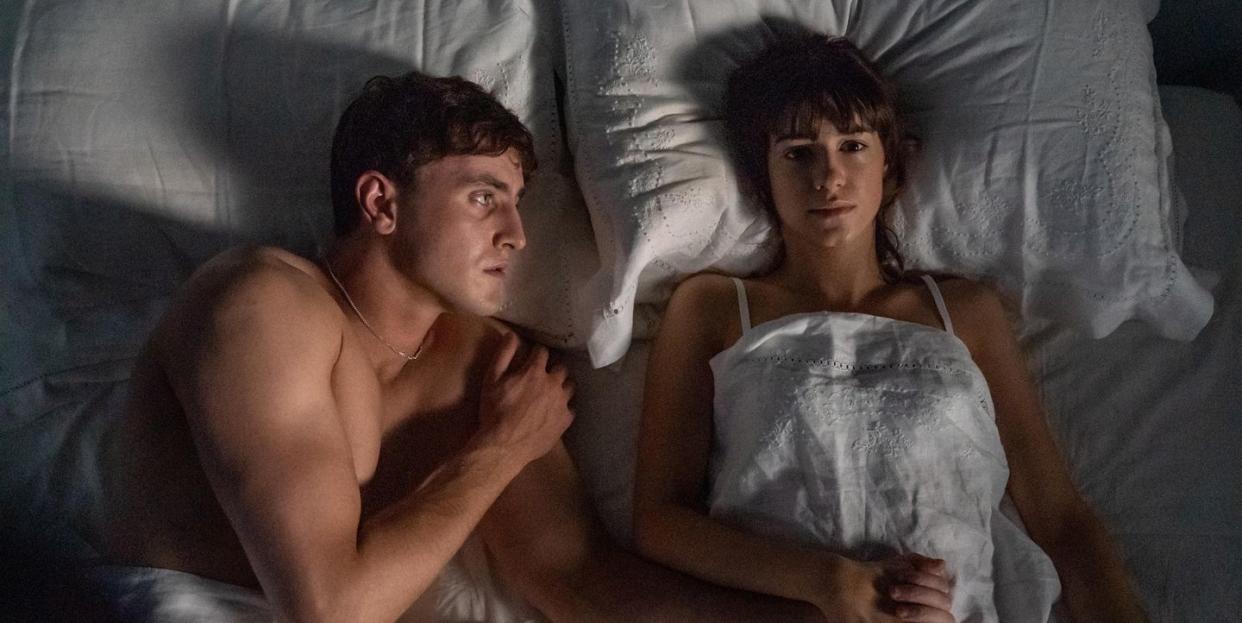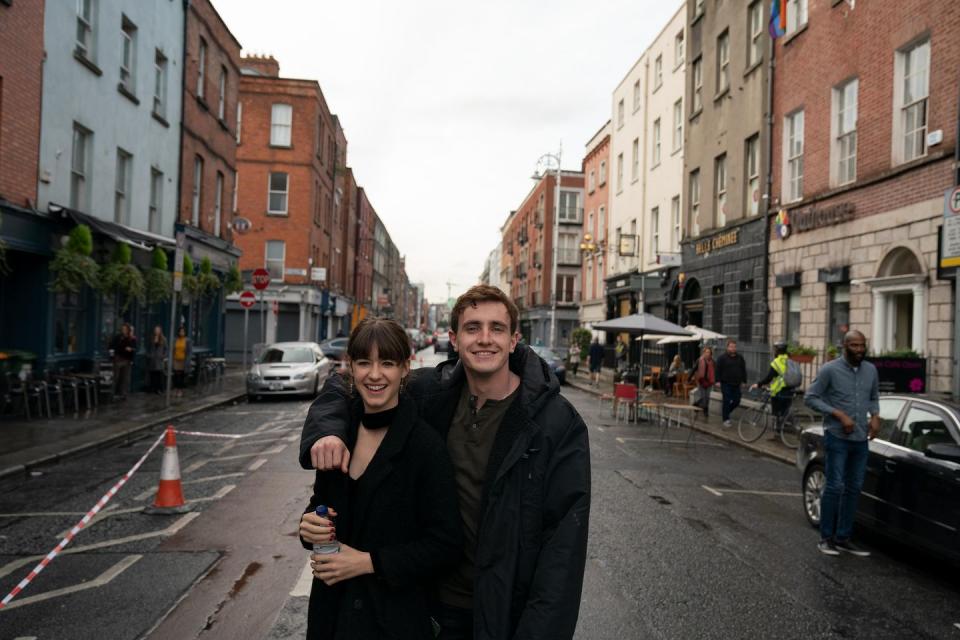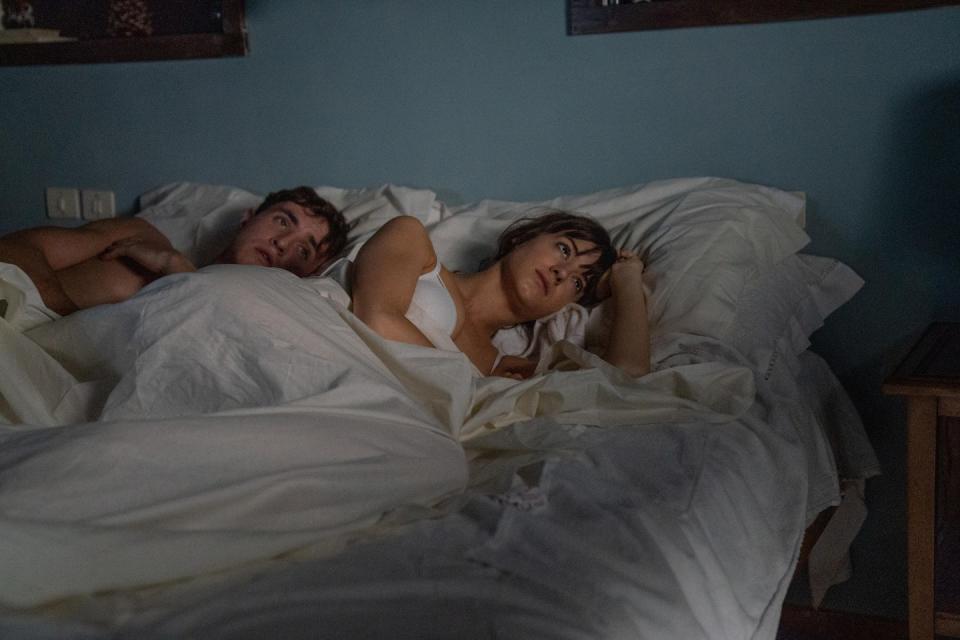'Normal People' Stars Went from an Awkward Online Encounter to "Seismic" Chemistry

Forget stories about superheroes and futuristic robots: During a near-global lockdown, the greatest fantasy of all is the thought of just spending time with other people. When Sally Rooney’s novel Normal People debuted in 2018, it was widely acclaimed for the intimacy and familiarity of the author’s writing; readers flocked to it because of how deftly the book depicted the subtlest nuances of modern relationships.
Now, as we all self-isolate our way through a worldwide pandemic, the novel’s screen adaptation—out today, April 29, on Hulu and BBC Three—feels like a time capsule from the world of a few months ago, a world in which we were all free to go outside, to hug our friends, to dance with strangers at parties. That’s not to say it isn’t a hyper-relatable, pitch-perfect account of millennial life; it’s still all of those things. It’s just that watching the show today is an intensely wistful experience in a way that it might not have been at the beginning of 2020.
Despite this, the story of Normal People still feels as immediate as ever, in large part because of the performances of Daisy Edgar-Jones as the prickly smarty-pants Marianne Sheridan and Paul Mescal as the popular, eager-to-please Connell Waldron. The series follows Connell and Marianne from high school through college and into young adulthood, periods during which they drift into, out of, and back into each other’s lives. Edgar-Jones and Mescal are a revelation, bringing Marianne and Connell to life so fully and believably that you might suspect Rooney herself conjured them into being. The truth is even more remarkable: Prior to preparing for their respective auditions, Mescal and Edgar-Jones were perhaps the only two people left in the world who hadn’t read the novel. (They swiftly remedied that oversight and are now avowed Rooney fans.)
Before the show’s premiere, the two rising stars hopped on Zoom with BAZAAR.com to share a little insight about what makes Normal People such a special story. Even through a computer camera lens, Edgar-Jones and Mescal have an easy affect, both amongst themselves and in general. Mescal has exactly the kind of wholesome, guileless good looks you’d expect of a country-boy intellectual jock like Connell, and Edgar-Jones—all wide eyes and sharp cheekbones—has a face that can go from adorable to intimidating on a dime.
Together, the costars spoke about getting off on the wrong foot, filming authentic sex scenes, and playing characters with staying power.
First things first: How familiar were you with Sally Rooney before you started shooting, and what was it like to work with her?
Paul Mescal: I obviously knew about her, but my introduction was [when I was auditioning for] Normal People—and then I was frustrated to find out that there were only two novels that I could devour. It’s an embarrassment of riches to get to work on subject matter like that, and I think me and Daisy would be incredibly lucky to work on anything half as good as that for the rest of our careers. During the filming process, Sally was actually writing a new novel in New York, so she wasn’t particularly present all the time on set, but she had a very big input via producers and directors, and it was great to feel her approval throughout the shooting process.
Daisy Edgar-Jones: My mum actually read it in her book group and was like, “It’s great!” So, yeah, I sent off my self-tape, and then read the book. But she was wonderful, she was so lovely, and I hope she likes [the show]. It must be crazy for her, because she created these characters and now we’re all talking about them!
The characters’ internal monologues are so central to the reading experience, and you don’t have that in the show. What did you both do to prepare for your parts, and how do you relate to your characters individually?
DEJ: I think what is wonderful about the adaptation is that we don’t overexplain anything, really. We allow the audience to find out stuff as we go along. But we were so lucky, ’cause the book is so incredibly detailed in every extent, so it’s great to have that source material when you’re coming to a scene.
There’s lots about Marianne that I really related to, particularly in her school years when she talks a bit about trying to kind of change who she was for a day and seeing if that would change the way that people sort of act with her—and it doesn’t really, because I think when you’re with the same group of people from a young age, it’s very hard to redefine yourself. But there’s also a lot about Marianne that’s quite dark and that I didn’t have easy access to, so it was amazing having such brilliant source material.
PM: The book kind of became my best friend throughout the process. Any questions I might have in the lead-up to a scene were answered in such detail by the book. And then I think it was a matter of getting to work with Lenny [Abrahamson] and Hettie [Macdonald, the show’s two directors], who love working with actors and who direct with such a deft touch.
The chemistry between the two characters is so key to the story, obviously, and you two have such amazing chemistry throughout the show. How did you prepare to have that relationship on-screen?
PM: Yeah, so, um, it didn’t really start on the best foot, because I had heard that Daisy was cast, and I sent her a message, which was rudely shunned and not replied to.
DEJ: Oh, my gosh, I can’t believe this. This is not true!
PM: Anyway, I forgave her very quickly, because once we started rehearsing, I think ultimately it came down to just me and Daisy really getting on and having lots of fun. Also, I think it was useful that we were both playing characters that are kind of seismic of the shape of our careers—we both hadn’t led a television series, so we were kind of in it together.

Daisy, you pointed out how great it is that the show doesn’t overexplain anything, but in that process, it also becomes really apparent that Connell and Marianne are kind of awful communicators! Why do Connell and Marianne keep missing each other in this way?
DEJ: Yeah, I mean, I think that’s why the book and the series resonate so much. We do that all the time, not even in just relationships—I also do it in my daily life when I’m trying to say something and I just do it wrong! I think that’s part of being a human being. And I think it’s so interesting with Connell and Marianne, because they’re so intelligent and they’re so able to communicate honestly about such massive seismic things, and yet in the really simple stuff, they seem to struggle, and I think it’s because they are such deep individuals that they project things onto each other that are coming from within, rather than what’s really happening in the dynamic. And I really relate to that, when you’re insecure and it comes out in a way that is negative, rather than sitting with yourself and discussing why you’re feeling like that.
PM: Yeah, I think the fact that they’re incredibly intelligent, bright individuals doesn’t necessarily make them totally secure in themselves. It can make you feel quite naked to articulate a weakness in yourself to the point where ultimately in the moment, it feels easier to not talk about it, and that can really damage a relationship. But I think that’s just the human condition, unfortunately.
This is very much a post-recession story that’s about what it means to come of age now. What do you think Normal People gets right about modern life and relationships that most stories miss?
PM: Sally Rooney. [Laughs.] There’s something supernatural about her in terms of how she’s able to observe a situation, and observe our peer group and our generation, and be able to notate it in an almost documentarian style. I think she is the key to that answer, personally.
DEJ: And she is able to create characters that don’t always have to be empathized with or liked. You know, she’s creating characters that sometimes aren’t very nice and act in ways that are unfortunate. I think that’s really amazing. But I would also say that the story is kind of cross-generational and timeless, really, because ultimately, it’s about growing up, and that’s something we can all relate to, whatever age we are.
The show handles mental illness very frankly without feeling like an after-school special. Why do you think that’s important, and how were you able to connect to that aspect of the story?
PM: What I find really refreshing, and I still remember reading it—in other dramas, normally, when a character is depressed or struggling with something, there’s an overt reason behind why that’s the case: an abusive father or a violent moment or something. But Sally presents Connell as someone who’s well liked in school, he’s academic, he’s sporty, and he struggles a lot with anxiety and things like that, but it’s not “explained.” He just appears like a normal human being. I think that makes the portrayal of anxiety and depression all the more important in this series, because people will recognize themselves in both Connell and Marianne, and the difficulties they face. It allows an audience accessibility into those things, and it doesn’t make those things taboo. It’s one of the parts of the show that I was incredibly excited as an actor to get to play, but also one that I really, really wanted to get right, because it’s not often that you get to portray something that is so prevalent in your generation and amongst your peers.
DEJ: What I hope is that our generation is able to be a bit more vocal about things. I think it’s less of a taboo to be able to openly say, “I’m not feeling okay.” I think we acknowledge that that’s something everybody goes through, and it’s just part of being a human being.

There are a lot of sex scenes in the show, but for some reason, they never feel “racy,” and I think that’s because they felt grounded in the story, rather than gratuitous. What role do those scenes play, and why are they so important to understanding both characters?
PM: I completely agree with all of those things that you said, and I’m really proud of the representation of sex in this show, to be honest. I’m personally allergic to racy sex scenes in TV and film that are just there to be a sex scene. Ultimately, I think sex in real life is the ultimate kind of seesaw of power in a relationship, and when it’s harnessed correctly, it’s the most dynamic part of a relationship. Like, we’re used to being in a relationship where we’re constantly in dialogue verbally, and it suddenly becomes a physical dialogue. It’s a means of expression that is incredibly intimate and important to human beings in general.
It’s wild to think that Normal People was one of the last major projects filmed before the world totally changed. Watching the show made me very homesick for parties and being outside, and living beyond my computer screen.
PM: [Laughs.] Yeah.
How does it feel to know that?
DEJ: It is mad! Actually, we did a couple of pickups that were really important to the show literally a week before we went into lockdown, so we feel very lucky that we actually got to even finish it, because that would have really been a shame if we hadn’t been able to.
It is funny, because when I watch anything right now all I can think of is social distancing, so if anyone’s even holding hands, I’m like, [gasps]! So it is going to be strange, coming out now, but I think it’s really sort of poignant, because the show is so much about relationships, and I think that’s something that we’re all really holding onto at the minute, be it with friends or family or anybody. It’s such a nice show to be coming out now, in such a strange time, when we’re isolating and not even able to be around strangers.
PM: Yeah, I think it’s sort of come at the right time for people in isolation, because hopefully, the times that are represented in the show aren’t miles and miles away. I think it’s important to remember at this time that we should really value those moments where we can be in contact with the people that we love again.
This interview has been edited and condensed for clarity.
You Might Also Like

